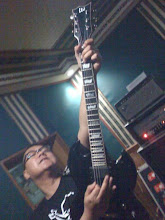

Guitar Related Injury (a Medical Review)
Many guitar players run into serious problems when they discover that they have picked up an injury from doing what they love, injuries will generally repair over time but this can mean an extended period of not playing guitar. Many guitarists have found it necessary to take a few weeks off guitar playing or in some more extreme cases several months or years. Some people think that they are immune from getting various arm, wrist and tendon related injuries because they have been playing for years with no problems - this tends not to be the case when guitarists start to concentrate their efforts on playing long periods of time on guitar for example 5 to 9 hours to increase speed or ability in heavy legato and bending.
Avoiding Injury
Guitar players should always warm up their hands and arms with slower guitar pieces or exercises before diving straight into the more advanced, fast and complicated material, this will give the muscles a period of time to stretch and get used to the motions of playing. Playing guitar is a bit like playing a sport - if caution is not exercised in warming up muscles before taking part in a given activity then serious injury can occur. It is unwise to avoid warming up due to laziness as skipping several minutes warm-up can mean several months of guitar inactivity due to straining.
Guitar straps should always be at a comfortable level usually this is based above the waist area on the chest, playing guitar at a decent height means arms are not subjected to stretching epic lengths to access lower frets - less effort is required to be put in by the arm and therefore injury is less unlikely to happen.
Another great way to avoid injuries is to exercise regularly. There is almost always some static tension in your arms and back when you play guitar, and a great way to minimize the risk of getting hurt is to do some moderate work out a few times each week. You don't have to do a lot, but some regular exercise makes you less vulnerable to tension related injuries.
Injuries Associated With Guitar Playing
The key worry for many Guitar players is acquiring RSI or Repetitive Strain Injury - this is similar to a burning sensation that can irritate the wrist or tendons in the hand, this is generally cause by not warming up in conjunction with playing guitar at a bad angle due to low strap height or not sitting the guitar properly on the knee.
Another injury guitar players are susceptible to is Tendonitis - this is very similar to RSI but is more localised in the Tendons or blood passages to the hand, generally caused by hard bending this causes irritation near where the fingers meet the hand.
Carpal Tunnel Syndrome is another injury many guitar players have acquired over the years, again it is a type of strain but it is usually located around the wrist area, where the central blood passage begins to separate out to the five fingers of the hand, such strains are again caused by playing the guitar too low or at an uncomfortable level.
Treatment for Guitar Related Injuries
The best advice is always to seek the help of a medical professional who specialises in strains or arm injuries, failing this option being available members of GMC have also found helpful the use of:
1. Muscle Gel or Deep Heat - use of these two products generally relaxes muscles and places less strain on the arms, relieving tension on the injury and therefore helping it to heal faster.
2. Vitamin Tablets and Cod Liver Oil help provide the right vitamins etc to soothe the joints, more specifically for tendon and muscle injury Glucosamine + Chondroitin are good for building blocks of connective muscle tissue around the joints, tendons and ligaments.
3. Rest! There is no better way to heal an injury than by stopping the use of physical activity by the arm or hand with the problem. Rest stops straining and starts the rebuilding of damaged tissues and as such is probably the single most necessary factor for ending a period of injury.


No comments:
Post a Comment